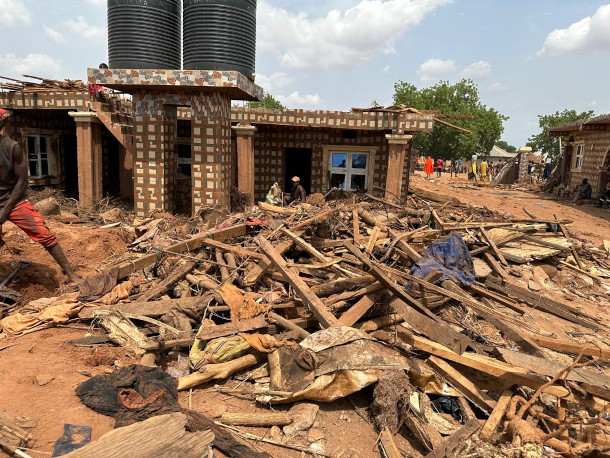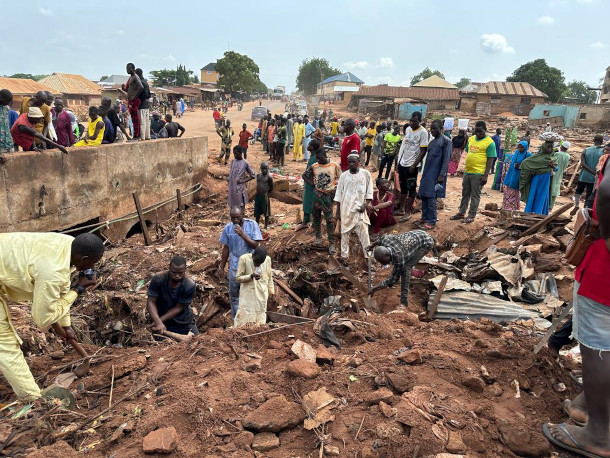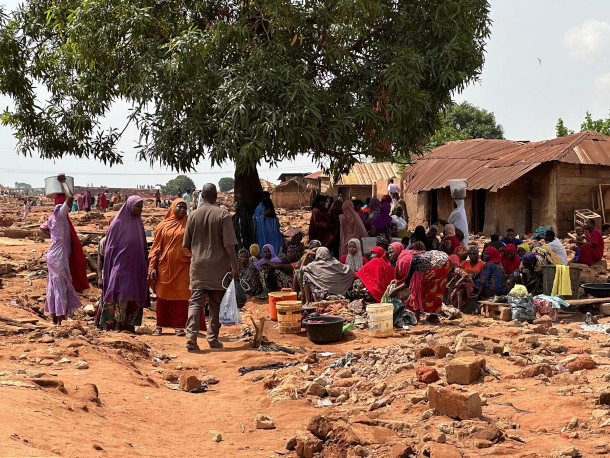Climate Injustice Floods Nigeria
Air Date: Week of June 13, 2025

The aftermath of the flooding in Western Nigeria. (Photo: Uwaisu Idris)
At the end of May a flood caused by torrential rain swept into Mokwa, a poor rural community in western Nigeria, leaving behind a horrific scene of death and destruction. Uwaisu Idris reported from the scene for Deutsche Welle and joins Host Jenni Doering to talk about how climate change is bringing more intense floods to Nigeria, and the responsibility of the rich nations of the world to assist poor countries that did not cause the climate crisis.
Transcript
DOERING: It’s Living on Earth, I’m Jenni Doering.
At the end of May a flood caused by torrential rain swept into Mokwa, a poor rural community in western Nigeria, leaving behind a horrific scene of death and destruction. Over 200 people were reported dead, and hundreds of others are still missing. The flood washed away homes, schools, and bridges. And in the aftermath of this climate-strengthened destruction, the future of the people of Mokwa hangs in the balance. Uwaisu Idris traveled to Mokwa to report on the situation as a correspondent for Deutsche Welle, and he’s back home now in Abuja, the capital of Nigeria. Uwaisu, welcome to Living on Earth.
IDRIS: Thank you very much. It's my pleasure joining you on this show.
DOERING: Well, thank you so much for being here. Now, can you describe for me what it was like when you first arrived in this community that had been devastated by these floods? What did you see?
IDRIS: It's a shocking situation when I first arrived. It's unbelievable to me, because the water has already gone, but the devastation within a few minutes, don't think it lasted up to an hour, everything is gone, because it's a local settlement whereby it's not a modern building, most of the houses are made by mud blocks. You see people in a devastation, in the confusion stage. Only one building I could see that, I've seen that is still standing, which we climb on top to get a clear view with our camera. And then the number of people who died, nobody can say, because there is no data. There are beggars, we are told, who were staying in one of the uncompleted buildings, over 100 of them. All of them are gone. They were all swept away by the rain, by the flood, and everybody is coming with his number of children, number of families that are gone. It's a nucleus set up that we have in Africa, large compound housing, almost everybody the same family, and everybody has his own children. Some are crying, some are yelling. Some could not even stand to talk. I interviewed somebody who is over 80 years, he said all his children are gone. His wife is gone, and he is sick. He's old. Nobody to cater for him. So myself, I was touched. I was affected by what happened. Because I don't know when I started crying at a point, but just to be strong that I know I have to work.
DOERING: That is just absolutely devastating. My heart goes out to these people. Uwaisu, in the aftermath of these terrible floods, you interviewed Azumi Usman, a mother who lost five children and her family lost 16 grandchildren in total. I can't imagine her pain. What did she tell you?
IDRIS: Azumi is in a state of devastation, as at the time I interviewed her, she cried several times, and she just managed to be strong to grant me that interview. All what she had was gone. The entire house was reduced to rubble, nothing she was showing me. This is where my house used to be. But I don't even think about the house, but I think about my family, my grandchildren, my children, they are all gone. I don't know where to pick [up] my life. I don't know where to start from. At that point, she said, I cried several times, but the tears have dried. But just imagining where to start her life. She doesn't know where to start her life.
DOERING: The water has receded, but there is so much devastation that's left, so much loss. What do the people of Mokwa hope for at this moment?
IDRIS: The most immediate need for them is food and shelter, because some of them are sleeping there. It rained when I was there, and you could see how they were scampering to see where to hide. Some know where to go and hide. Some had to climb on trees that are around there until after the rain, and you have only one cloth you cannot change. So you have to wait for that cloth to dry on your body. So that is the situation.
DOERING: You know, elsewhere in the broadcast, we have a story about how the cuts to USAID are impacting African farmers, who often have just enough grain saved to make it to the next harvest. What's the situation that Mokwa farmers are facing now in the aftermath of these floods?
IDRIS: It's more devastating for them, because already, the USAID cut has affected so many farmers in Nigeria because of the intervention they've been doing over the years. Just overnight, that has stopped, and now this is a community whereby is the beginning of rainy season. The tradition is, you save what you produced to last you up to the time when you are going to start even early harvesting. They haven't even planted anything, and their entire saving for what they are going to eat is gone. And then the USAID intervention has stopped. So it's a double jeopardy for them, because if that intervention is still running, they may be able to fast track certain things. They will get seedlings, they may get fertilizer, they may get even technical aids on how to start and where to start. But that is not there. That window is totally shot. It's a serious situation.
DOERING: Right, I mean, any of the grain that they were saving to eat, any of the grain they were saving, the seed they were saving to plant this season, that is all washed away. They have nothing.

Mokwa residents use shovels, hoes, and other tools to search through rubble. (Photo: Uwaisu Idris)
IDRIS: Yeah, they have nothing. Everything is washed away by the flood.
DOERING: Now, in recent years, Nigerian communities have been experiencing severe floods, resulting in hundreds of deaths. How is climate change making communities with poor infrastructure even more vulnerable?
IDRIS: Climate change has been affecting Nigerian communities in a worse situation of recent because the mitigation method is not yet there. There are so many promises of mitigating climate change. Yeah, disasters doesn't knock at your door. It can happen anytime, but you can foresee that there might be flood based on the predictions, because Nigerian Meteorological Agency has already predicted about some of the areas that might. It has released a report which indicated 31 states in Nigeria, including Niger State. And Mokwa is close to the fringes of River Niger, there are certain areas that used to experience flood, so it's really a devastating situation. And climate change is becoming more and more real because the temperatures are going high every year. Like this year, we had so much heat in Nigeria, even as at the time I was in Mokwa, it was very hot in the afternoon. I had to look for a hat to use to be able to have some shield on my head, it's really, really hot. Why? Because of climate change. You have so much rain within short time whereby the drainages cannot contain that amount of rain that is coming at the same time, and then the mitigation is almost close to zero.
DOERING: You mentioned that mitigation of climate change is just not happening, and a huge part of that is the fact that, you know, a lot of the rest of the world has been pumping greenhouse gasses into the atmosphere for decades and decades, and now places like Nigeria are really suffering the consequences of that.

Displaced Nigerian flood survivors gather. (Photo: Uwaisu Idris)
IDRIS: How much is Nigeria contributing? How much industries does Nigeria has? Nigeria is very, very low in terms of that emission of gas. We've been having this COP to COP; this COP, that; the discussion will happen, and at the end, where do you see the implementation? So developed countries are the ones who are producing these greenhouse gasses, and now it's affecting Africa and third world countries more because they don't have the technology to even think of doing the mitigation. When agreements are signed, you don't see the implementation in reality to be able to take care of these unforeseen circumstances, of disasters that are happening as a result of climate change.
DOERING: You know, as the climate rapidly changes, there's a lot of talk about climate justice. What does Nigeria need from the international community to help it become more resilient against climate impacts that it had virtually no role in causing?
IDRIS: I think Nigeria needed a lot. Number one, when there is an agreement, let me give you a classical example. Developed countries, they have the capacity to do direct intervention. The recent organization that is working for the European Union, they reach out to me and ask me, How best do you think can we do intervention for the Mokwa people? I said, go through the community leaders. When there are international agreements reached, do not just dump whatever you think you are doing to the government, but rather see how you can go directly to get this climate justice. There are various ways. There are organizations that have been working, especially civil societies, that who are working on the environment. They know how people can benefit directly.
DOERING: It sounds like, almost like a grassroots system of aid is needed. You know, really small scale, like in individual communities, is where this help is needed.
IDRIS: Exactly, exactly, grassroots, so that you go directly to those who can benefit from.
DOERING: So Uwaisu, how much help are these devastated communities receiving from the international community?
IDRIS: Well, they, I know UNICEF is there. They have established their own camp, and then the International Committee of the Red Cross. They are also on the ground there. I heard that the European Union, they are also planning to send their own shipment. And then the Turkish Government also, they sent their own shipment. I don't know whether it has arrived. So, but there is need for more, because if you imagine this happen in any European countries, it will continue to be attracting attention more. I know how difficult it is by so many countries -- the economic meltdown, there is Palestinian issue, there is Ukraine, but life is life. There is need for more intervention by the international community to help these people, because they need to live. They need to pick [up] and continue with their lives under this devastation. Especially women and children, if you see the situation children are -- I don't know, it's, it's unexplainable by anyone on radio.
DOERING: So from what you have seen and reported, what do you think the road to recovery looks like?
IDRIS: The road to recovery is a long one. Some may end up not recovering, because those who are really old, and then women and children, orphans who lost their parents, and everybody is battling with his own problems, and knowing the economic situation the country is, the road to recovery is challenging, and it may take years. I have the fear that some may not even recover, because when you have this kind you are in this kind of devastation, and you have health challenges and you are not getting the needed support. Some are hypertensive, some are diabetic, and then you have this kind of life, life challenges. How do you marry the two together? That was why I said they need a lot of urgent help and assistance, but within the community, within the Nigerian government and the international community, so that they can pick [up] their lives and start something.
DOERING: Uwaisu Idris is a correspondent for Deutsche Welle. Thank you so much, Uwaisu.
IDRIS: Thank you, my pleasure.
Links
Uwaisu Idris’ original report for DW
Uwaisu Idris’ update on the Nigerian flooding
A US press release on the withdrawal of USAID Foreign Aid
More on how Nigeria’s weather has been affected by climate disruption
BBC | “More Than 700 Believed Dead in Devastating Nigeria Floods”
Living on Earth wants to hear from you!
Living on Earth
62 Calef Highway, Suite 212
Lee, NH 03861
Telephone: 617-287-4121
E-mail: comments@loe.org
Newsletter [Click here]
Donate to Living on Earth!
Living on Earth is an independent media program and relies entirely on contributions from listeners and institutions supporting public service. Please donate now to preserve an independent environmental voice.
NewsletterLiving on Earth offers a weekly delivery of the show's rundown to your mailbox. Sign up for our newsletter today!
 Sailors For The Sea: Be the change you want to sea.
Sailors For The Sea: Be the change you want to sea.
 The Grantham Foundation for the Protection of the Environment: Committed to protecting and improving the health of the global environment.
The Grantham Foundation for the Protection of the Environment: Committed to protecting and improving the health of the global environment.
 Contribute to Living on Earth and receive, as our gift to you, an archival print of one of Mark Seth Lender's extraordinary wildlife photographs. Follow the link to see Mark's current collection of photographs.
Contribute to Living on Earth and receive, as our gift to you, an archival print of one of Mark Seth Lender's extraordinary wildlife photographs. Follow the link to see Mark's current collection of photographs.
 Buy a signed copy of Mark Seth Lender's book Smeagull the Seagull & support Living on Earth
Buy a signed copy of Mark Seth Lender's book Smeagull the Seagull & support Living on Earth

